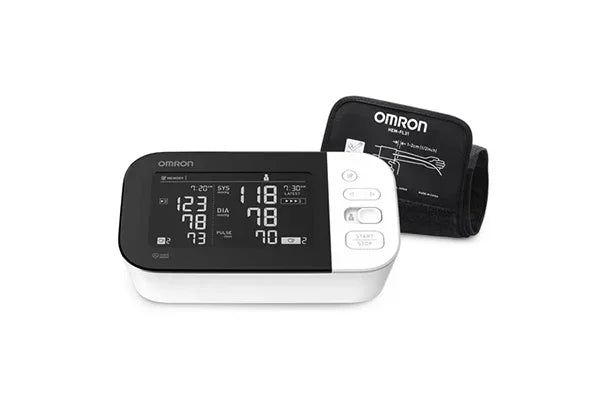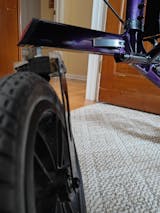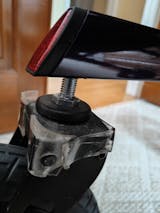Monitoring blood pressure at home has become increasingly prevalent due to its convenience and accessibility. Digital blood pressure monitors, such as the Omron 10 Series Upper Arm Blood Pressure Monitor, have revolutionized self-care, allowing individuals to track their heart health effectively. However, with a plethora of options available, questions and uncertainties often arise. This comprehensive guide aims to address common FAQs about digital blood pressure monitors, empowering you to make informed decisions and optimize your blood pressure management.
How Do Digital Blood Pressure Monitors Work?
Digital blood pressure monitors employ non-invasive monitoring technology to measure blood pressure. You have to wrap a cuff around the upper arm and it gets inflated by the unit. As the cuff deflates, the device detects changes in blood flow through the artery, calculating systolic and diastolic pressures. These values are then displayed on a digital screen.
Are Digital Blood Pressure Monitors Accurate?
Modern digital blood pressure monitors like Omron 10 Series BP Monitor available from All Care Store are highly accurate when used correctly. Clinical studies have demonstrated their reliability in measuring blood pressure compared to traditional manual methods. However, factors like cuff size, proper positioning and user technique can influence accuracy.
Which Type of Monitor Should I Choose?
Several types of digital blood pressure monitors are available:
- Arm monitors: Considered the most accurate, they measure blood pressure on the upper arm.
- Wrist monitors: More convenient but less accurate than arm monitors. The Omron wrist blood pressure unit is highly reliable and recommended by doctors as well as healthcare experts.
- Finger monitors: Compact but often less reliable, suitable for occasional checks rather than regular monitoring.
The choice of a favourable and best BP monitor depends on your individual requirements, preferences and price as well.
How Often Should I Check My Blood Pressure?
The frequency of blood pressure monitoring depends on your health condition and doctor's recommendations. Generally, it's recommended to check your blood pressure at the same time each day, such as in the morning before breakfast.
How Do I Choose the Right Cuff Size?
Using the right size for the cuff is imperative to achieve accurate readings. Most monitors come with standard-sized cuffs, but it's essential to measure your arm circumference and select a cuff that fits properly. If a cuff isn’t the appropriate size for your arm, it can lead to inaccurate results.
Can I Use My Monitor on Both Arms?
While it's generally recommended to use the same arm consistently, checking blood pressure on both arms can provide valuable information. If there's a significant difference between the readings, consult your doctor.
What Factors Can Affect My Blood Pressure Readings?
Myriad factors can influence the accuracy and efficiency of blood pressure readings, including:
- Stress and anxiety: Elevated blood pressure due to emotional factors.
- Physical activity: Blood pressure may increase temporarily after exercise.
- Medications: Certain medications can affect blood pressure.
- Full bladder: A full bladder can slightly increase blood pressure.
- Cigarette smoking: Smoking is known to raise blood pressure levels.
- Caffeine and alcohol: These substances can elevate blood pressure.
How Do I Know if My Blood Pressure Readings Are Normal?
A reading below 120/80 mmHg is considered to be normal blood pressure. However, individual blood pressure goals may vary based on factors like age, health conditions and medications. It's essential to consult your doctor to determine your target blood pressure range.
What to Do if My Blood Pressure Reading is Above Normal?
If you consistently measure high blood pressure readings on your Omron Series 10 Upper Arm Blood Pressure Monitor, consult your doctor for proper evaluation and treatment. Lifestyle modifications, such as diet, exercise and stress management, can often help lower blood pressure.
Can I Use My Blood Pressure Monitor to Diagnose Hypertension?
A digital blood pressure monitor can help you track your blood pressure, but it cannot diagnose hypertension. A diagnosis requires a comprehensive evaluation by a healthcare professional.
How Do I Care for My Blood Pressure Monitor?
To ensure the longevity and accuracy of your electronic blood pressure cuffs, follow the manufacturer's care instructions. This typically includes storing the device in a cool, dry place and protecting it from shocks and moisture.
Can I Share My BP Readings with a Doctor?
Yes, sharing your blood pressure readings with your doctor is essential for effective blood pressure management. Some monitors allow you to connect to healthcare providers electronically, making it easier to share data.
By understanding these common FAQs and following the guidelines provided, you can effectively use a digital blood pressure monitor to manage your heart health. Remember, while home monitoring is valuable, it's crucial to consult your doctor for regular check-ups and personalized advice.







